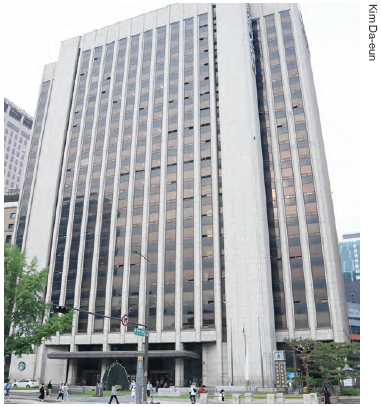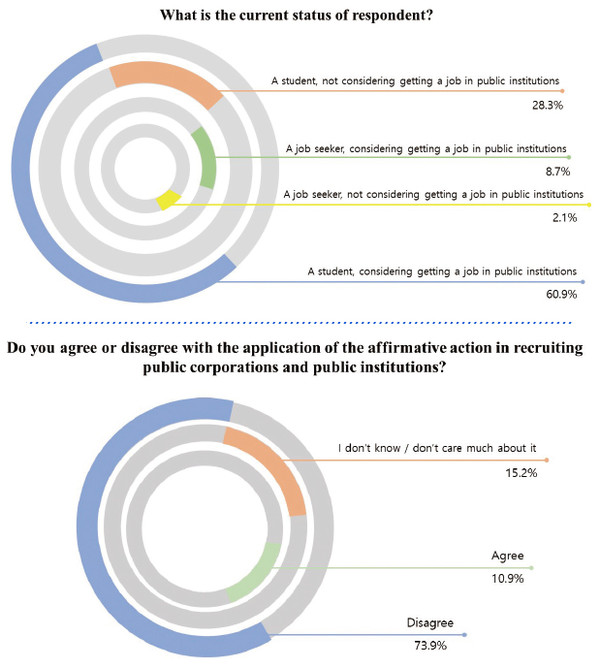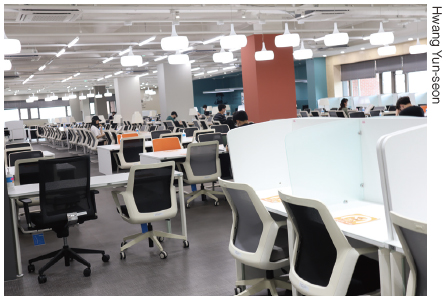“South Korea is not ‘Republic of Korea’. It is ‘Republic of Seoul’.”
The newly coined term ‘Republic of Seoul’ is a satirical reference to the phenomenon wherein most of South Korea’s social capabilities are concentrated in Seoul and other metropolitan areas. The Ministry of Land, Infrastructure, and Transport announced in 2019 that the total gap in this regard, including the population between metropolitan areas and provincial areas, is declining. However, a qualitative gap still exists in terms of economic power and infrastructure. The economically active population, employment, investment, and businesses are concentrated in the metropolitan areas. Moreover, there is an imbalance in access to amenities, such as welfare organizations, medical facilities, and cultural facilities. Therefore, the capital city is bound to differ in speed and scale of development compared to local cities. Even considering that Seoul-centered urbanization has emerged as a serious problem.

The circumstances of rural residents differ from that of the residents in Seoul. The youth are unable to find jobs in the provincial areas and, therefore, have to go to Seoul in search of jobs. If the population is drained from rural areas to Seoul, investment in education and jobs in rural areas will decrease naturally. Moreover, even if there are jobs, when the local talents go to Seoul, resulting in an inevitable difference in the quality of output. In other words, the provincial areas are caught in a vicious circle. These areas have poor infrastructure including job shortages and low-quality education. A lack of jobs forces young people to move to metropolitan areas; this increases low birth rates and aging simultaneously. This phenomenon leads to a decrease in demand for goods and services, which in turn results in job shortages.
Unbalanced regional development can incur significant social costs to the entire country. Therefore, national efforts are required for the even development of the country. The quota system as part of the regional human resources affirmative action measure is one such effort. It refers to a quota system in which public institutions located in selected cities other than the metropolitan areas are required to hire more than a certain percentage of people who have graduated or are expected to graduate from local universities or high schools. If the school they have graduated from is not located in their native area, they were excluded from the recruitment. Currently, 27 percent of the public institution employees subject to the system are filled with local talent, and the long-term goal is to make it 30 percent. The system is part of an affirmative action to expand regional development and social equity workforce. The eligibility condition to be a part of the system is not where the job seeker comes from, but graduation from a local university. Therefore, it aims to not only encourage balanced regional development but also ease the preference for “in-Seoul universities,” which have a positive impact on employment in South Korea. In other words, the system is designed to create more jobs and improve the quality of local education.
Many university students dream of getting a job at a public enterprise. This is because public companies and institutions can be stable workplaces and provide a work-life balance. Moreover, the retirement age is guaranteed, and welfare benefits are good. For these reasons, university students who live in Seoul or graduate from universities in Seoul sometimes complain about the system because they think affirmative action makes it difficult to get a job in public companies. The UOS Times seeks to examine the utility and grounds for and against a quota system as part of the regional human resources affirmative action measure. In addition, we investigate the perceptions of students at the University of Seoul (UOS), a university that works toward achieving the goals of affirmative action.
With the need for the introduction of affirmative action, some believe that affirmative action is operating well following its purpose. There is evidence that it has a positive impact on not only college students but also residents in rural areas.

The quota system as part of regional human resources affirmative action can ease the educational imbalance between Seoul and other cities.
◆ There are preparations that people who are trying to get a job in public institutions must undergo. For example, there is a test called “National Competency Standards” (NCS). This test is not easy, and there are relatively few institutes that help prepare for this test in rural areas. However, in metropolitan areas, especially in Seoul, there is a whole neighborhood that has several institutes where the people who want jobs in public enterprises go to prepare for this test. Since students in non-metropolitan areas do not get this opportunity to prepare for jobs as much as students in metropolitan areas, affirmative action is needed to fill the gap and create an equal environment.
Beneficiary A is a student majoring in tourism management at Sangji University. A is now preparing for the NCS to get a job in public institutions. A says that an educational imbalance exists, which makes the preparation for a job in public companies difficult. “It is more difficult for “non-in-Seoul” university students to get a job in public enterprises because going to a private academy or getting information is more difficult for them.” She said that about 40 percent of her acquaintances in university are now preparing to get a job in public institutions, and it is bizarre that there are very few ways to stay updated about the test and the other processes for getting a job.
Regional competency of non-metropolitan areas can be enhanced by affirmative action.
◆ By dispersing the concentrated population, various parts of an area can be developed. As more people are heading to a city that is not a metropolitan area, more infrastructures—for example, subways, bus lines, and public libraries—will be built in that city.
◆ Public institutions have become an exclusive domain of students from “in-Seoul” universities. Due to the regional imbalance in education, many people who succeeded in getting a job in public institutions have been from “in-Seoul” universities. However, affirmative action has also enabled the students from “non-in-Seoul” universities to enter public institutions. This way, these students who succeed in getting a job in public institutions can represent the region to which they belong. As more students get jobs in public institutions, the regions where their universities are located can be represented more, and regional competency will grow accordingly.
◆ Affirmative action can contribute to the economy of cities. The economy of cities that are not metropolitan areas grows as more people settle there because of their jobs. Moreover, commercial districts are usually established around the workplace. Thus, more people getting jobs in those areas and settling down will be helpful to the regional economy.
A says that, although she is a beneficiary, she has to do all the things that the other students do. “I am preparing for the history exam, TOEIC, NCS, and for all the certificates that are needed for the entrance even though I am a beneficiary. In my opinion, even with affirmative action, getting a job in public institutions is still difficult because the number of applicants who apply through this channel is quite high these days.”
Further, A expressed her opinion about the controversies regarding affirmative action: many “in-Seoul” university students oppose affirmative action and see it as a kind of reverse discrimination. “I am quite sure that a student who can enter an “in-Seoul” university will not choose a “non-in-Seoul” university because of affirmative action. The reason for this is the prejudice that living in a non-metropolitan area would be difficult as there is a lack of proper infrastructure. Breaking down these prejudices would be the first step in finding a solution to the controversies.”
Despite the need to introduce affirmative action, some people oppose this measure. The opposition to affirmative action is coming mainly from students attending universities in Seoul or the metropolitan areas. They oppose affirmative action for the following reasons.
Affirmative action is reverse discrimination against the “in-Seoul” university students.
◆ Affirmative action contradicts the blind recruitment system, which is another system for hiring in public institutions. It helps the employers evaluate people based on their working skills, and not external conditions such as age, gender, or academic background. However, to hire people who have qualified under affirmative action, the university from which they have graduated must be specified in the application. This contradicts the purpose of blind recruitment.
◆ “In-Seoul” universities usually require higher school records to enter public institutions than local universities. In other words, “in-Seoul” university students have higher abilities if higher admission scores mean higher work suitability. On this premise, these students are job seekers with better abilities and should be able to receive better benefits in the hiring process. Therefore, affirmative action increases the possibility of “in-Seoul” university students—who are more capable—being discriminated against by not getting hired according to their abilities.
◆ In the process of selecting beneficiaries of affirmative action, other students who live in regions where no university is located may be subject to discrimination. The beneficiaries of affirmative action are graduates of universities located in the region where the public institution is located and not the residents. Therefore, students who are residents of these regions but studied in an “in-Seoul” university will not be eligible for the benefit. Further, students residing in Seoul are not eligible for affirmative action.
◆ Graduate B has graduated from the Urban Engineering Department at UOS. B says that many people around him prefer public institutions, and so does he. “The major companies can enter with a master’s degree or higher, but I did not want to be a graduate. As for other private engineering companies, I do not think I will be satisfied with their salaries and benefits. Since I have never thought about a job not related to my major, I am considering entering a public company.”
Graduate B believes that it is easier for people who have graduated from local universities to enter public companies because of affirmative action. “The cutoff for the written test is lower for the beneficiaries of affirmative action.”
Graduate B said he opposed affirmative action for the following reasons: “I grew up in Seoul and went to a university in Seoul. However, there are only a few vacancies to which I can apply. Although the vacancies in public institutions located in other local areas are open to candidates based on affirmative action, public institutions located in Seoul do not have a similar measure for Seoul residents. I feel it as reverse discrimination.”
A quota system as part of regional human resources affirmative action measure cannot achieve equal regional development. In other words, it is ineffective.
◆ If we accept the premise that “in-Seoul” university students have better abilities, it implies that graduates of local universities have fewer abilities. Hiring job seekers with fewer abilities leads to poor-quality business results. Employees with fewer abilities will work less efficiently; therefore, the purpose of this system to encourage even development cannot be achieved.
◆ Affirmative action cannot resolve the problem of preference to “in-Seoul” universities. The fundamental purpose of a university is academic research. Just giving preference to certain universities in employment cannot substitute the contributions of “in-Seoul” universities, which are at the center of academic research with high-quality educators and infrastructure. The quality of education is achieved by investing more actively in education. Institutes of Science and Technology are treated as prestigious universities, irrespective of where they are located because they have the high-quality infrastructure. These would be good examples.
◆ Affirmative action does not help create jobs. The measure is implemented only in public institutions, not private enterprises. We cannot arbitrarily increase the number of public institutions, and the number of jobs in public institutions is also limited.
◆ The current system creates another regional gap because it is based on the location of the university from which the students have graduated. Only those areas that have universities can benefit from this measure. Therefore, the gap between the beneficiary and the non-beneficiary regions widened, resulting in another regional imbalance.
What do students in UOS, a university in Seoul, think about affirmative action? The UOS Times tried to understand their perception through a survey, the results of which are discussed below.

First, 69.6 percent of the students who participated in the survey answered that they intended to prepare for employment in public institutions. Of these, 73.9 percent opposed affirmative action, 10.9 percent supported, and 15.2 percent had no opinion.
Of the students who opposed affirmative action, 79.4 percent said “the system is reverse discrimination against students attending universities in Seoul” as the reason for their opposition. Of these, 61.8 percent said, “The abilities of applicants employed by public institutions would decline because the eligibility criterion for being a beneficiary of affirmative action is graduation from a local university.” “Deciding whether to hire or not based on differences in university location is not in line with the purpose of strengthening regional capability” is what 33.4 percent of the students said as the reason for their opposition. Of the students who said they had no opinion, 25.6 percent thought the first answer was the most valid reason, while 85.7 percent and 57.1 percent agreed with the second and third answers, respectively.
“This is a minimum measure to strengthen regional capability at a time when the concentration in Seoul has become too severe,” was the answer chosen by 71.4 percent of the students who favored affirmative action. Further, 14.3 percent of the students said, “It is an effective measure to prevent local talent from going to the metropolitan area.” Of the students who said they had no opinion on affirmative action, 71.4 percent and 42.9 percent chose the first and second answers, respectively, as the most reasonable.
Through these arguments, there has been a demand to make affirmative action more effective by revising some of its conditions. Opponents argue that measures that are more effective than affirmative action should be considered. “Affirmative action is not fair,” graduate B said. Thus, opponents such as B claim that there are more substantial problems to be solved before implementing temporary remedies. They say that the quality of education in local universities should be improved, jobs should be created by providing incentives to local companies, and local infrastructure should be developed so that residents can enjoy a quality of life similar to that in Seoul. Moreover, strengthening blind recruitment instead of affirmative action will be more effective in achieving the goal of equal regional development. In contrast, proponents argue that the prejudice on the non-metropolitan areas is blocking the possibilities for their development; thus, breaking the prejudice by building infrastructures and promoting regional merit will give a fresh start to this whole debate. Further, beneficiary A added that “even if affirmative action is in place, students still prefer entering ‘in-Seoul’ universities rather than a local university and take the benefit of affirmative action.”

Affirmative action was introduced to ease the educational imbalance between Seoul and other cities, ease preferences for “in-Seoul” universities, graduating from which has been believed to be an advantage in the job market in South Korea. However, there are also several controversies regarding affirmative action. There are two sides to the controversy. On the one hand, the proponents of affirmative action highlight the need for balanced development among cities. On the other hand, the opponents claim that affirmative action is a kind of reverse discrimination against “in-Seoul” college students.
Getting a job in public enterprises can be attempting since the job market in South Korea is highly competitive and jobs in private businesses have a relatively shorter life span than jobs in public enterprises. As a result, more college students prefer getting a job in public enterprises.
In this heated discussion, there have been some suggestions to improve affirmative action and to address the controversies surrounding it. These include strengthening blind recruitment instead of affirmative action, building more infrastructures in local areas, and improving the quality of education in local universities. Moreover, regarding the educational imbalance, there should be more institutions that help university students get jobs and provide information in this regard, like in metropolitan areas.
The debate on affirmative action is inevitable and ongoing. The reason for this is that the eligibility criterion for affirmative action—the location of the university—can be changed, unlike the gender quota system or the quota system for disabled people. Moreover, this debate will only intensify as more people start preparing for jobs in public institutions. In such a situation, the public’s attention is desperately needed more than ever. The effective revision or another measure that can replace affirmative action will help improve the situation for college students who are in search of jobs. This kind of revision will be able to be derived from enough discourses among various people with enough attention from the public in this society.
Kim Da-eun
daeunkim749@uos.ac.kr
Hwang Yun-seon
mono071227@uos.ac.kr

